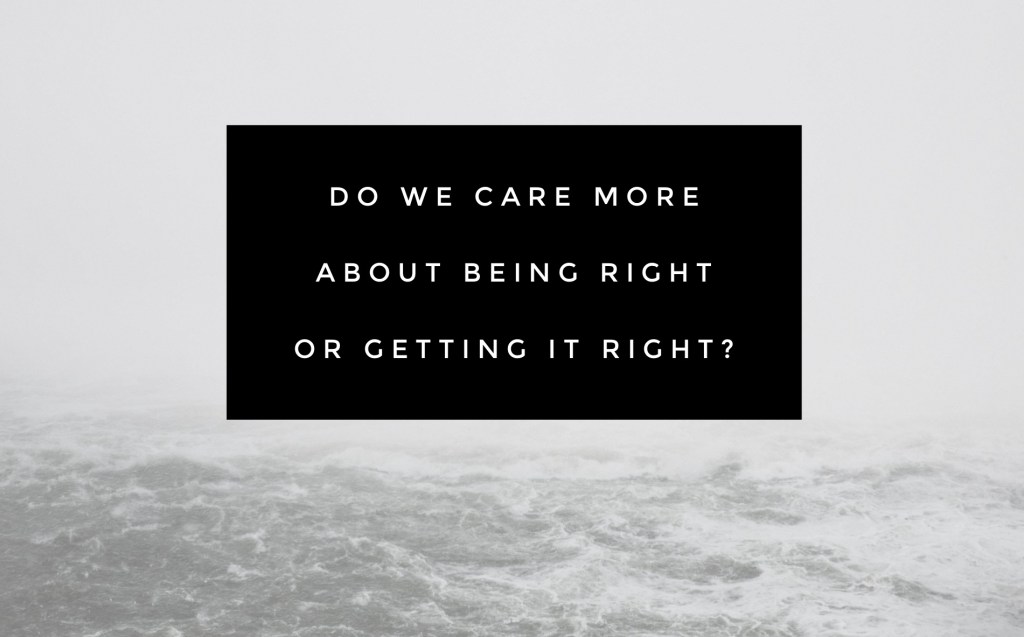
Brene Brown recently asked if we are more interested in being right than getting it right. The answer is, in most cases, obvious. From mainstream to social media, being right is the goal. The only goal.
Rolling Stone magazine just ran a story about a hospital that treated so many ivermectin overdoses that gunshot victims had to wait untreated. It was a horrifying story except for one problem: it wasn’t true. They hadn’t treated ivermectin overdoses and no one went untreated. Woops. The magazine had to issue a “correction.”
For many years, I taught Rhetoric to high school juniors and seniors. If any of them had made that claim without backing it up, they would have seen a lot of red ink. And a grade that reflected lack of critical thinking. I don’t understand how we can teach courses like calculus, but not logic, in our schools. No one looks at the media and observes a lack of math skills.
The truth is that most don’t even notice the lack of logic. I’m not sure what class teaches our kids how to think, reason, build arguments, or critically analyze them. If we want to give an opinion, we simply state it and lump all dissenters into some name-calling category. It’s the same on both sides.
Oh that we could collectively stop, take a deep breath, and agree to some ground rules: One, acknowledge two sides to every issue. Second, every claim must have supporting reasons. The degree to which one’s argument is strong is the degree in which the reasons—and supporting backing–are strong. Third, apply the assumption of good will to others and don’t use vitriol.
And no matter the issue, we focus on getting it right. This most often involves recognizing that information is continually changing, “facts” take time to verify, and everyone has a different ground level of belief. Perhaps we could stop judging people as good or bad based on how their beliefs line up with our own.
Processing life can take a minute. At the core, we are all living, breathing, problem-swaddled people trying to do the best we can. The only way “being right” can work is if we surround ourselves with other “right” people. Ah, the love we feel for people just like us.
But feeling good isn’t love. It’s ego. To truly love another, we accept their value as a fellow human. To accept the vaxxer and anti-vaxxer, the one who is boycotting Texas and the one supporting the state’s ruling, the mask wearers and those who stand against.
I know people in all the various groups. And while the rhetoric on unsocial media is upsetting, the people behind it are likely trying to make sense of life. Perhaps fearful. Likely overwhelmed with it all. Human.
Being right is a quick process. We take a stand and practice name calling and finger pointing. Getting it right, however, is anything but quick. It’s a life-long process of learning to let go of our ego and learning to love those not like us. It doesn’t exclude arguing; it excludes name calling and bad words as substitutes for critical thinking. It excludes hatred.
For those that want to argue their way through issues, perhaps learning how to argue would be a first step. Put a conclusion on a piece of paper. List three reasons why you believe that to be true. Then find two or three pieces of support for those reasons.
I have no idea how to get it right these days. I just want to stop caring about being right. It’s time we examine our motives and decide where we stand on this. Do we care more about being right or getting it right? That question should make us all think.
Yes! and Amen!
LikeLiked by 1 person
Thanks Mary Jo♥️
LikeLiked by 1 person
Oh that this could be sent to every MSM person and ‘unsocial media’ user. So well said. Could we all just take the assignment to ‘learn how to argue’. Thank you Ms. Logic Professor. Perhaps you should resurrect some of those lesson plans and start a podcast.
LikeLiked by 1 person
I do love me a good logic lesson plan😊 But a podcast??😳
Thank you Linda. Always grateful for you stopping by to read. And for taking time to comment.💕
LikeLike
So beautifully stated Kathy. I’m continually uplifted by your life-giving and thought-provoking narratives. It can’t be stated enough, that there are indeed, two sides on each issue. Each of us, as individuals, needs to decide where we land, and accept that not everyone is going to have the same perspective, and leave it at that. The dogmatic approach of trying to convince others to think the same, will always fail.
LikeLiked by 1 person
Aw, thank you for such a kind, encouraging, and thoughtful response. I so agree with you and deeply appreciate your taking time to read and share💕
LikeLike
” I don’t understand how we can teach courses like calculus, but not logic, in our schools.” A most profound statement. That one change in our education system would make the world, at least our country change.
LikeLiked by 1 person
I taught that class to 8th graders and continue to get feedback from students—long since having graduated college—on how that helped. What a gold mine of resources we would have today 🤪
LikeLike